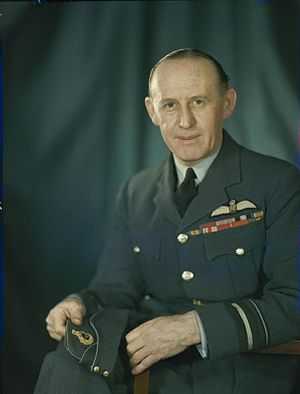Philip Wigglesworth
| Sir Philip Wigglesworth | |
|---|---|
|
Air Marshal Wigglesworth CB CBE DSC, the Deputy Chief of Staff (Air), Air Staff, SHAEF (Rear). | |
| Born | 11 July 1896 |
| Died | 31 May 1975 |
| Allegiance |
|
| Service/branch |
|
| Years of service | 1916–1948 |
| Rank | Air Marshal |
| Commands held |
AHQ East Africa British Air Forces of Occupation |
| Battles/wars |
World War I World War II |
| Awards |
Knight Commander of the Order of the British Empire Companion of the Order of the Bath Distinguished Service Cross |
Air Marshal Sir (Horace Ernest) Philip Wigglesworth, KBE, CB, DSC (11 July 1896 – 31 May 1975) was a senior officer in the Royal Air Force.
RAF career
Educated at Chesterfield Grammar School, Wigglesworth joined the Royal Naval Air Service, a precursor of the RAF, in 1916, flying both fighters and bombers.[1] His actions during an aerial battle on 23 January 1917 resulted in a Distinguished Service Cross for "conspicuous gallantry and enterprise":[1] he suffered serious frostbite in that action.[2]
He served in World War II as head of the Combined Planning Staff at Headquarters Middle East Command, as Senior Air Staff Officer at Headquarters RAF Middle East and then as Air Officer Commanding AHQ East Africa.[1] He became Deputy Air Commander-in-Chief at Mediterranean Air Command in 1943 and Deputy Chief of Staff (Air) at SHAEF in 1944.[1] After the War he was commander of the British Air Forces of Occupation from 1946 to 1948 when he retired.[1]
He was appointed a Knight Commander of the Most Excellent Order of the British Empire in the 1946 New Year Honours.[1] He later became President of the Old Cestrefeldian Society.[3]
See also
References
- ↑ 1.0 1.1 1.2 1.3 1.4 1.5 "Air Marshal Sir Philip Wigglesworth". Air of Authority - A History of RAF Organisation. Retrieved 9 June 2010.
- ↑ DNW Medals
- ↑ Old Cestrefeldian Society - Past Presidents
| Military offices | ||
|---|---|---|
| Preceded by Sir Sholto Douglas |
Commander-in-Chief British Air Forces of Occupation 1946–1948 |
Succeeded by Sir Thomas Williams |
